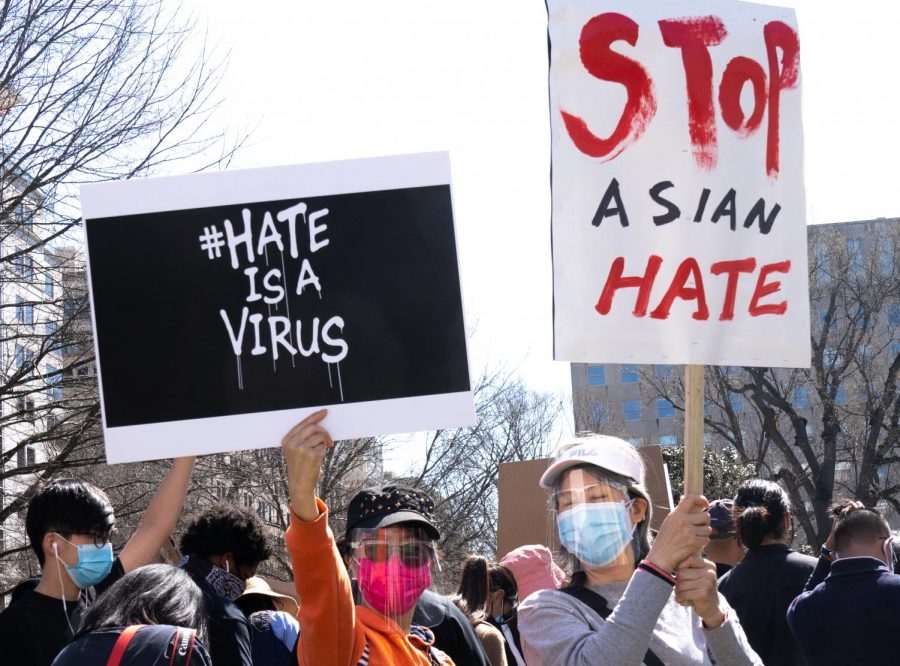Opinion | Racist fetishization underlays Atlanta shooting
Two women hold up signs at a rally to stop asian hate in McPherson Square, D.C on March 31. Columnist Rayna Wuh argues that the recent Atlanta shooting was racially motivated and that an unhealthy fetitization cannot be linked to the cause of the event.
April 1, 2021
On March 16, a white gunman rampaged through three spas in metro Atlanta, fatally shooting eight people, six of whom were women of Asian descent. The shooter claimed that he was not racially motivated, but it is likely no accident that the majority of victims were Asian women.
Instead, he blamed his “sexual addiction” and authorities stated he attacked to eliminate his “temptation.” However, gender-based violence and racism are not mutually exclusive. In fact, racism and misogyny against Asian American women are inextricably linked.
The Atlanta shootings are only a single instance of the increasing race-related hatred aimed at the Asian American community since the start of the pandemic — a topic covered extensively in one of my previous articles. According to a report by the Center for the Study of Hate and Extremism, in 2020, anti-Asian hate crimes surged 149% in the largest cities — as high as 800% in New York City — while overall hate crimes dropped 7%.
Another organization, Stop Asian American Pacific Islander Hate, found that out of the nearly 3,800 incidents of hate they recorded in 2020 and 2021, more than two-thirds were reported by women. Women have been disproportionately affected by the recent rise in hate, but as more generalized racism against Asians, this is nothing new.
Racism and sexism’s intersection against Asian and Asian American women goes back centuries. The particularly harmful stereotype that Asian women are hypersexual, docile, exotic and submissive has been reinforced by federal law, military occupation and media portrayals of Asian women.
During the first major wave of Asian immigration, there were several attempts by the U.S. government to exclude certain populations, one such attempt was the Page Act of 1875. This act purportedly aimed to prevent prostitutes from migrating to the United States.
However, in practice, it systematically prevented all Chinese women from entering the U.S. The application of this law reinforced the preconceived notion that it was acceptable to view Asian women in a singular, sexualized context.
Later, U.S. imperialism also contributed to shaping such attitudes. During U.S. military conflicts, including the Phillippine-American and Vietnam wars, these aforementioned stereotypes caused Asian women to be presented as, “object(s) for western consumption and the satisfaction of western desire.” Creating the denigrating fiction of the “exotic,” “oriental” woman that was utilized to sexually exploit, and occasionally act violently against Asian women.
Pop culture also plays a role in perpetuating these biases. Movies ranging from Stanley Kubrick’s 1987 Vietnam War film “Full Metal Jacket” to Tina Fey’s 2004 teen comedy “Mean Girls” mask racial discrimination and fetishism as jokes.
A scene in “Full Metal Jacket” shows a Vietnamese woman propositioning herself to American soldiers, using phrases such as “me so horny” and “me love you long time” that later incorporated into the American vernacular.
“Mean Girls” also makes a punchline of an Asian character. Trang Pak plays no role in the movie other than being a sexually charged underage girl engaging in an affair with the gym teacher, an older white male.
These submissive perceptions, once made into jokes, tend to excuse and trivialize the harsh realities of racial and gendered prejudice that Asian women face.
Assigning this singular narrative to a diverse group of people is dangerous whether it is through law, war or pop culture.
Fetishism, a phenomenon deeply rooted in such stereotypes, occurs when there is a fixation on race as the only aspect of someone’s identity. Asian Americans have long had to withstand the effects of “yellow fever,” or racial fetish revolving around the so-called desirability of Asian women.
A 2013 study by a business site Quartz illustrated that on dating apps, of the 2.4 million heterosexual interactions reviewed, non-Asian men were most drawn to Asian women. Although not all of the interactions involve fetishism, there is no doubt that the increased attention, especially from white society, is connected to the long history of disproportionately sexualizing Asian women.
Fetishism presents itself in a variety of ways other than extreme, violent actions. Asian women regularly face objectification and stereotyping, especially by white men.
All too often I hear stories from my Asian friends on dating apps who often receive inappropriate comments from people who maintain the false notion that fetishism is somehow a compliment. While some playoff, the perception that Asian women can be defined solely by their race and the related stereotypes is depersonalizing and homogenizing.
As if psychological burdens were not bad enough, fetishism can also manifest themselves in more violent forms. Although there lacks an evident motive in the Atlanta spa shootings, the identities of the victims illustrate the killer was likely motivated by some combination of racism and misogyny.
Eight people were murdered in an act of hatred and the shooter told authorities he was merely trying to “eliminate his temptations.” Instead of acknowledging how the continued normalization of sexualizing and stereotyping Asian women could have contributed to this specific demographic’s classification as “temptations” and later murder victims, the authorities released a statement sympathetic to the shooter.
After the suspect was caught, the Cherokee County Sheriff’s Captain Jay Baker said, “yesterday was a really bad day for (the shooter), and this is what he did.”
The victims who lost their lives deserved better. Asian American women deserve better. The Atlanta shootings need to be recognized for what they are: a heinous hate crime specifically targeting Asian women. Long-standing stereotypes make Asian women increasingly prone to harassment and violence. We must educate ourselves and actively work towards protecting vulnerable populations before even more people get hurt.
Rayna is a freshman in LAS.
[email protected]







